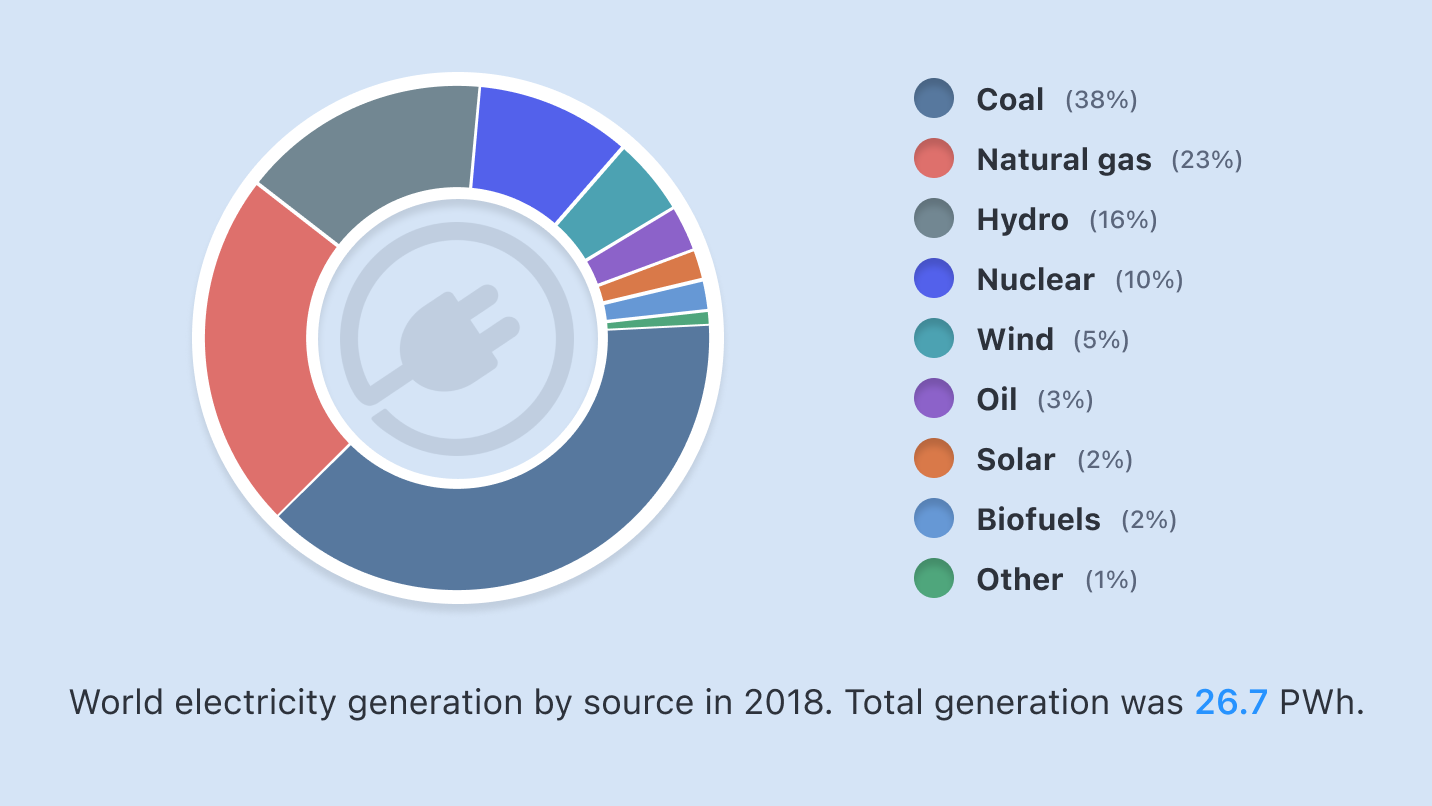How does Bitcoin impact the environment?
Last updated

Table of Contents
Overview
Almost all criticism of Bitcoin’s environmental impact, real and imagined, can be summed up by the following statement. Bitcoin is bad for the environment because it consumes a lot of electricity, which makes Bitcoin morally reprehensible. There are really three claims being made here.
1. Bitcoin consumes a lot of electricity.
2. Consuming a lot of electricity is bad for the environment.
3. Things that are bad for the environment are ethically bad.
We believe there is a lot of truth in each of these claims, but the way in which these claims have been discussed have often misrepresented truth. Let’s take each claim one by one to help clarify some of the bigger misconceptions.
Claim 1: Bitcoin consumes a lot of electricity
If you were told that Bitcoin currently consumes around 71.86 Terawatt hours per year, would that mean anything to you? For most people, comparisons are necessary to understand what these kinds of numbers mean. Recently, headlines like this one from the BBC have used eye-catching comparisons to countries to show that Bitcoin consumes a lot of electricity. However, we must be wary of comparisons like these because the choice of what you compare can influence how you feel, similar to this optical illusion.
 Though the two circled dark discs are the same size, the left disc seems smaller than the right one.
Though the two circled dark discs are the same size, the left disc seems smaller than the right one.
That BBC article’s information comes from the Cambridge Bitcoin Electricity Consumption Index (CBECI). What the BBC article failed to mention is that the CBECI also reports that Bitcoin accounts for approximately 0.37% of the world’s electricity consumption. The CBECI puts that another way, the entire Bitcoin network could be powered by just 35% of the transmission and distribution power losses in the USA. In other words, the energy wasted in the US electrical grid is three times the energy used by Bitcoin globally. We’ll go into more detail on Bitcoin’s use of excess and wasted energy later in this article.
Many media articles have written about Bitcoin’s potential for exponential energy growth, largely based on its past growth rate. For instance, a 2017 Newsweek piece famously ran with the title "Bitcoin Mining on Track to Consume All of the World's Energy by 2020." Interestingly, this same argument was used about the Internet’s electricity usage, yet the Internet has not had a catastrophic effect on global power consumption, nor has Bitcoin. Instead, developing countries understandably account for most of the global power consumption increase since 1990.
The Internet hasn’t deranged global power consumption, due in part to its adoption curve, which is slowing down, but also due to the huge improvements that have been made in computer efficiency. This and many other considerations are also applicable to Bitcoin, and they mean that Bitcoin’s electricity usage will not continue to increase at the pace it has. Does this mean Bitcoin consumes, or does not consume a lot of power? Will Bitcoin’s power consumption increase a lot in the future? The unsatisfying answer, the answer that won’t grab headlines: it’s complicated. It depends on how you look at it.
Claim 2: Consuming a lot of electricity is bad for the environment
To begin, many have confused electricity consumption with energy consumption. Electricity is an important way to measure energy consumption, but focusing only on electricity can overlook other key contributors. For example, the agricultural industry uses far more fossil fuels than electricity. Comparing only Bitcoin’s electricity consumption to other industry’s electricity consumption can create unfavorable apples-to-oranges comparisons. Bitcoin consumes more electricity than the gold mining industry, but the gold mining industry consumes more than double the energy and contributes to other environmental problems such as deforestation and water pollution.
Almost all of Bitcoin’s energy consumption comes from the electricity used to run computer hardware (a small amount is used to manufacture and transport the computer hardware). Since electricity is produced from different sources, the environmental impact can vary depending on how that electricity is created: one kilowatt from a hydroelectric plant will impact the environment much less than one kilowatt from a coal fired plant. Knowing where Bitcoin’s electricity comes from, therefore, will help determine how bad Bitcoin’s energy consumption is for the environment.

The vast majority of Bitcoin’s electricity comes from Bitcoin miners. To estimate the energy composition, you can track where the Bitcoin miners are located and see how electricity is produced in those areas. Unfortunately, tracking Bitcoin’s energy composition is still a new prospect, so the best estimates are flawed. For example, they don’t include all the mining pools, or the energy mixture used is sometimes at the country level, which lacks the granularity to capture the differences in energy composition within regions of large countries like China and America.
This creates a big difference in estimates for Bitcoin’s energy composition. For example, this report suggests that 73% of Bitcoin’s energy consumption comes from renewables, while this report estimates that only 39% of Bitcoin’s energy consumption comes from renewables. The truth seems likely to reside somewhere between these two estimates.
If Bitcoin’s energy comes from 70% renewables, is this bad? What if that figure is only 40%? For context, America’s energy is 20% renewables.
Claim 3: Things that are bad for the environment are ethically bad
It’s not as simple as that. Let’s look at an example to show why.
Hospitals consume a lot of energy and create a lot of medical waste. Much of the waste is in one-use products like plastic packaging for sterile necessities such as syringes and needles, alcohol swabs, masks, and absorbent paper. With all of these negative environmental effects, are hospitals bad, or are they worth it? Most people would agree that hospitals are overall good, despite the negative impact they have on the environment. This illustrates an important point: despite being bad for the environment, sometimes things are still good.
This leads to the much more interesting (and difficult) question: is Bitcoin worth the environmental impact?
Is Bitcoin worth the environmental impact?
How you answer this question will depend on what you think about the three claims discussed above, and other factors too. For us, the answer is, yes.
We believe Bitcoin consumes a lot of electricity, though it’s relative size is less than some have tried to portray. We think Bitcoin’s electricity consumption will increase in the future, but at a much slower rate than in the past - similar to how the Internet’s energy has grown.
We aren’t convinced Bitcoin’s energy consumption is necessarily bad for the environment. First, there is evidence that Bitcoin’s energy consumption is from energy sources that would otherwise be wasted, such as from hydroelectric in some areas where energy production far exceeds demand. There’s also flared natural gas Bitcoin mining, which is a rapidly growing industry. Any waste energy Bitcoin uses adds very little extra harm to the environment.
Still, we are unsatisfied with Bitcoin’s current energy composition, whether it’s 40% renewable or 70%, or from waste energy. Bitcoin is a next generation technology that should run a next generation energy composition - and we believe that’s likely to happen.
Finally, and importantly, we believe Bitcoin is a force for good. From helping the estimated 1.7 billion unbanked people get access to wealth creating financial tools like savings accounts and credit, to addressing the UN’s Sustainable Development Goals (SDG 10) of reducing exorbitant International Remittance fees, Bitcoin is improving the lives of people who have largely been ignored by the legacy financial system.
Bitcoin is far from perfect. Like all industries, Bitcoin deserves scrutiny on issues of environmental impact. We are confident it is getting better for the environment, but even if it wasn’t, Bitcoin still does far more good than harm.
Read more: Understand the key features of the Bitcoin network, why it matters, and how it works.
Ready to get started? Buy as little as $30 of Bitcoin, hold it securely, and take self-sovereign possession of it with the Bitcoin.com Wallet, trusted by millions.
Related guides
Start from here →
What is Bitcoin?
Get a straightforward introduction to Bitcoin and why it matters.

What is Bitcoin?
Get a straightforward introduction to Bitcoin and why it matters.

How do I buy Bitcoin?
A beginner-friendly guide to buying Bitcoin step by step, with simple explanations and common options.

How do I buy Bitcoin?
A beginner-friendly guide to buying Bitcoin step by step, with simple explanations and common options.

How do I sell bitcoin?
Learn how to sell bitcoin into local currency safely.

How do I sell bitcoin?
Learn how to sell bitcoin into local currency safely.

How does bitcoin exchange work?
How safe is it to store your crypto on centralized exchanges?

How does bitcoin exchange work?
How safe is it to store your crypto on centralized exchanges?

How do I create a Bitcoin wallet?
Learn how to quickly and easily create a Bitcoin wallet. Understand the different wallet types and their respective pros & cons.

How do I create a Bitcoin wallet?
Learn how to quickly and easily create a Bitcoin wallet. Understand the different wallet types and their respective pros & cons.

How do I send bitcoin?
Sending bitcoin is as easy as choosing the amount to send and deciding where it goes. Read the article for more details.

How do I send bitcoin?
Sending bitcoin is as easy as choosing the amount to send and deciding where it goes. Read the article for more details.

How do I receive bitcoin?
To receive bitcoin, simply provide the sender with your Bitcoin address, which you can find in your Bitcoin wallet. Read this article for more details.

How do I receive bitcoin?
To receive bitcoin, simply provide the sender with your Bitcoin address, which you can find in your Bitcoin wallet. Read this article for more details.

What's a 'self-custodial' wallet?
Understand how the self-custodial model puts you in charge of your cryptoassets and protects you from third-party risk.

What's a 'self-custodial' wallet?
Understand how the self-custodial model puts you in charge of your cryptoassets and protects you from third-party risk.

What is Bitcoin governance?
How does the network operate and decide on critical issues?

What is Bitcoin governance?
How does the network operate and decide on critical issues?

What are Bitcoin debit cards?
Bitcoin debit cards make it possible to spend bitcoin anywhere credit cards are accepted.

What are Bitcoin debit cards?
Bitcoin debit cards make it possible to spend bitcoin anywhere credit cards are accepted.

What is Bitcoin mining?
Learn why the process of minting new bitcoins, known as 'Bitcoin mining,' is in some ways similar to the process of extracting precious metals from the earth.

What is Bitcoin mining?
Learn why the process of minting new bitcoins, known as 'Bitcoin mining,' is in some ways similar to the process of extracting precious metals from the earth.

How do bitcoin transactions work?
Understand how the Bitcoin public blockchain tracks ownership over time. Get clarity on key terms like public & private keys, transaction inputs & outputs, confirmation times, and more.

How do bitcoin transactions work?
Understand how the Bitcoin public blockchain tracks ownership over time. Get clarity on key terms like public & private keys, transaction inputs & outputs, confirmation times, and more.
STAY AHEAD IN CRYPTO
Stay ahead in crypto with our weekly newsletter delivering the insights that matter most
Weekly crypto news, curated for you
Actionable insights and educational tips
Updates on products fueling economic freedom
No spam. Unsubscribe anytime.



Start investing safely with the Bitcoin.com Wallet
Over wallets created so far
Everything you need to buy, sell, trade, and invest your Bitcoin and cryptocurrency securely

© 2026 Saint Bitts LLC Bitcoin.com. All rights reserved



